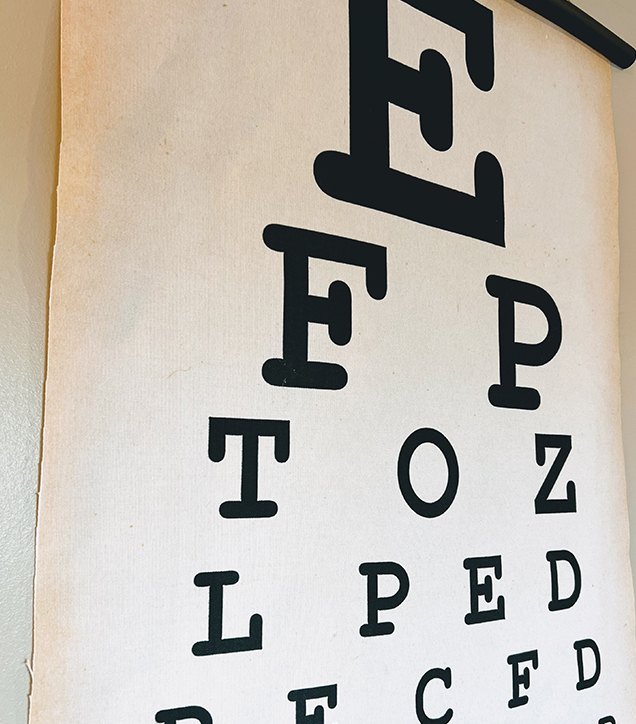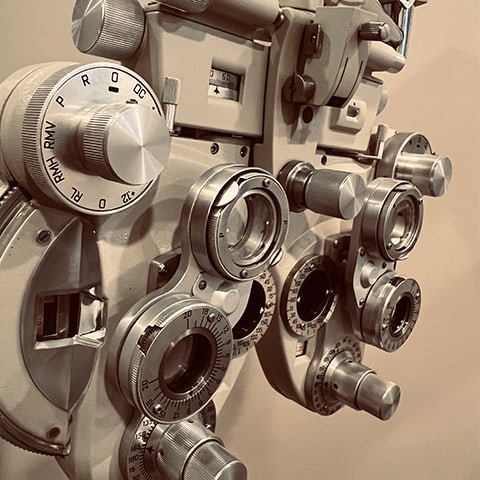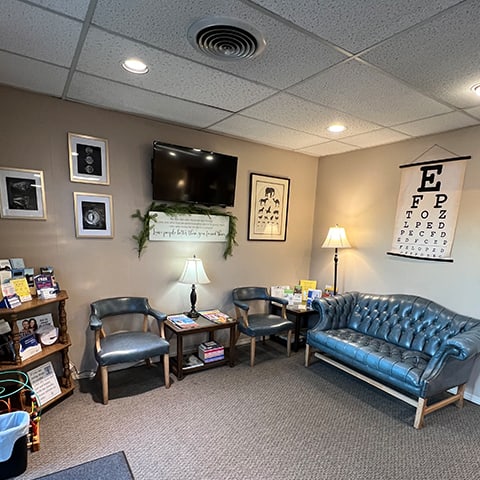Detecting & Diagnosing Eye Diseases
An eye exam is an important part of preventive healthcare. Not only can your optometrist check that your eyewear prescription is providing the vision you want, but during an eye exam, they can also check for the development of eye diseases and other serious eye conditions.
Many eye diseases can damage your vision permanently, and many progress without any noticeable symptoms, particularly in the beginning.
Early identification is crucial for the treatment and management of eye diseases. If your optometrist catches them early enough, they may be able to slow down progression or prevent vision loss.
Your sight is precious. Safeguard it today with a comprehensive eye exam.
Request Appointment
Diabetic Eye Diseases
People with diabetes are at an increased risk of eye diseases. Diabetic retinopathy and diabetic macular edema can lead to irreversible vision loss.
Diabetic retinopathy often progresses slowly and, like many eye diseases, may not present visible symptoms until irreversible vision loss occurs. Diabetic macular edema is quite serious and can impact the ability to read, write, drive, and recognize faces.
Both conditions can be identified early with a comprehensive diabetic eye exam. If you have diabetes, book your appointment now.
Request AppointmentGlaucoma
Glaucoma is a group of eye diseases generally characterized by damage to the optic nerve, usually by high intraocular pressure.
Pressure builds up inside the eye, damaging the optic nerve and causing irreversible vision loss. Often, the progression of glaucoma is slow and symptom-free, earning the disease the nickname the silent thief of sight.
There are several types of glaucoma. Click on each type to learn more.
Open-Angle Glaucoma
Fluid buildup caused by blockage of the eye’s drainage channels can increase intraocular pressure (IOP) and cause open-angle glaucoma. Generally, peripheral vision is the first thing impacted, followed by central vision.
Angle-Closure Glaucoma
Angle-closure glaucoma occurs when the space between the iris and cornea narrows, trapping fluid in the eye. When the pressure rises as a result of this fluid, angle-closure glaucoma occurs.
It can appear suddenly (acute) or progress gradually (chronic). Acute angle-closure glaucoma is a medical emergency. Sudden onset headaches, blurry vision, eye redness, or halos appearing around lights mean you should call your optometrist immediately.
Other Types of Glaucoma
Secondary glaucoma occurs when intraocular pressure is caused by eye trauma, injury, or infection.
When the optic nerve is damaged, but intraocular pressure remains within normal range, normal-tension glaucoma may be the cause.
Glaucoma Risk Factors
Glaucoma risk factors may include:
- A family history of glaucoma
- Extreme refractive errors
- Past eye injury or trauma
- Use of certain medications
- Heart disease, diabetes, or high blood pressure
Cataracts
As you age, the clear lens of your eye can harden and become opaque. This is called a cataract. They are often the result of the normal aging process, though they can be present at birth.
Symptoms of Cataracts
Cataracts generally develop without pain or redness. Some symptoms of cataracts might include:
- Foggy or blurry vision
- Difficulty seeing at night
- Seeing halos around lights
- Muted color vision
- Sensitivity to light
Preventing Cataracts
Cataract growth can be slowed by protecting the eyes from UV rays. A great pair of sunglasses can help! Eating foods rich in antioxidants like blueberries, apples, artichokes, and dark green veggies like kale and broccoli may also help to prevent cataracts.
Cataract Treatment
Often, obstructions to vision as a result of cataracts can be remedied through corrective lenses. But, cataracts can increase in size and may get to a point where glasses or contact lenses no longer provide the vision you want. In this case, we may recommend surgery.
If you’re having a difficult time driving or performing your job safely, are struggling to watch television or read, or are experiencing challenges with daily activities that are decreasing your quality of life, it might be time to explore surgery.
Cataract surgery is safe and effective, and we will help you understand the procedure and your options.
Age-Related Macular Degeneration
Age-related macular degeneration (AMD) causes the breakdown of the macula, the area of the eye responsible for central vision. Damage to the macula can lead to central vision loss.
The central vision is responsible for reading, writing, driving, and recognizing faces, so any loss of vision in this area may make day-to-day tasks difficult.
People with AMD may not experience any pain or symptoms as the disease progresses. If straight lines begin to appear wavy or your central vision blurs in a way that cannot be corrected by glasses, it’s time for an eye exam.
There are 2 types of AMD.
Dry AMD
We’re on the Lookout for Early Signs of Eye Disease
Regular, comprehensive eye exams are the best defense against eye diseases that can cause irreversible vision loss.
Book your appointment today, and let us examine your eyes for early signs of eye disease.
Request AppointmentCome Visit Us

Our Address
- 5910 S Lewis
- Tulsa, OK 74105
Contact Information
- Phone: 918-745-9700
- Fax: 918-743-8102
- Email: staff@adudleyod.com
Hours of Operation
- Monday: 8:30 AM – 5:30 PM
- Tuesday: 8:30 AM – 6:00 PM
- Wednesday: 8:30 AM – 5:30 PM
- Thursday: 8:30 AM – 5:30 PM
- Friday: 8:30 AM – 2:00 PM
- Saturday: Closed
- Sunday: Closed
Insurance & Payment Information
Dr. Dudley’s Primary Eye Care believes in providing the best value for you and your family. We have products and pricing that aims to accommodate all budgets and our office participates in most insurance programs. For patients who have little or no vision insurance coverage, flexible payment programs may be arranged. To learn more about our payment options, please call our office directly.
Vision Insurance
We accept several forms of vision insurance including:
- EyeMed
- Superior Vision
- Primary Vision Care Services (PVCS)
- Vision Care Direct
- Humana Vision
- Vision Service Plan (VSP)
- Care Credit
- And More
We are also provider for Medicare, several Blue Cross Blue Shield plans, BlueLincs HMO and United Health Care
*Please call our office with any insurance inquiries!
Flexible Spending & Savings Plans
- Flexible Spending Plans
- Health Savings Accounts (HSA)
- Medical Savings Accounts (MSA)
- Cafeteria Plans
All of the above plans can be used for all your eye care and eyewear needs, including eyeglasses, contact lenses, routine office visits and medical office visits.
Care Credit
The Care Credit card is available to help people pay for health care expenses, often with an introductory period that is interest-free. We accept Care Credit for all of our services. To learn more or apply, visit Care Credit here.
Our Services
Our Brands








Our Google Reviews
Our Blogs
Eye Exams: What to Expect
Eye Health and DiseasesYearly comprehensive eye exams are crucial to detecting changes in your vision and risk of eye-related diseases. We recommend adults have a comprehensive eye exam every year, and children should have an eye exam as early as six months before they start school, and then every 1-2 years. We often get questions about what to […]
Bifocal vs Progressive Lenses
Eye Health and DiseasesFor individuals that need vision correction both near and far, progressive or bifocal lenses are a must-have! As your eyes age and your vision changes, age-related farsightedness or presbyopia may start to affect your vision. What are Bifocal or Progressive Lenses? Progressive and bifocal lenses transition from near to far distance prescription within one lens! […]
6 Common Eye Symptoms and What to Do
Eye Health and DiseasesSuffering from eye discomfort or blurry vision can be scary, especially if it comes on suddenly or is a result of a dramatic event. Below are some of the common eye-related disorders. However, remember that common doesn’t mean it should be ignored. If you are experiencing any of these systems or if you have questions […]
Eye Exams: What to Expect

Yearly comprehensive eye exams are crucial to detecting changes in your vision and risk of eye-related diseases. We recommend adults have a comprehensive eye exam every year, and children should have an eye exam as early as six months before they start school, and then every 1-2 years. We often get questions about what to […]
Bifocal vs Progressive Lenses

For individuals that need vision correction both near and far, progressive or bifocal lenses are a must-have! As your eyes age and your vision changes, age-related farsightedness or presbyopia may start to affect your vision. What are Bifocal or Progressive Lenses? Progressive and bifocal lenses transition from near to far distance prescription within one lens! […]
6 Common Eye Symptoms and What to Do

Suffering from eye discomfort or blurry vision can be scary, especially if it comes on suddenly or is a result of a dramatic event. Below are some of the common eye-related disorders. However, remember that common doesn’t mean it should be ignored. If you are experiencing any of these systems or if you have questions […]









